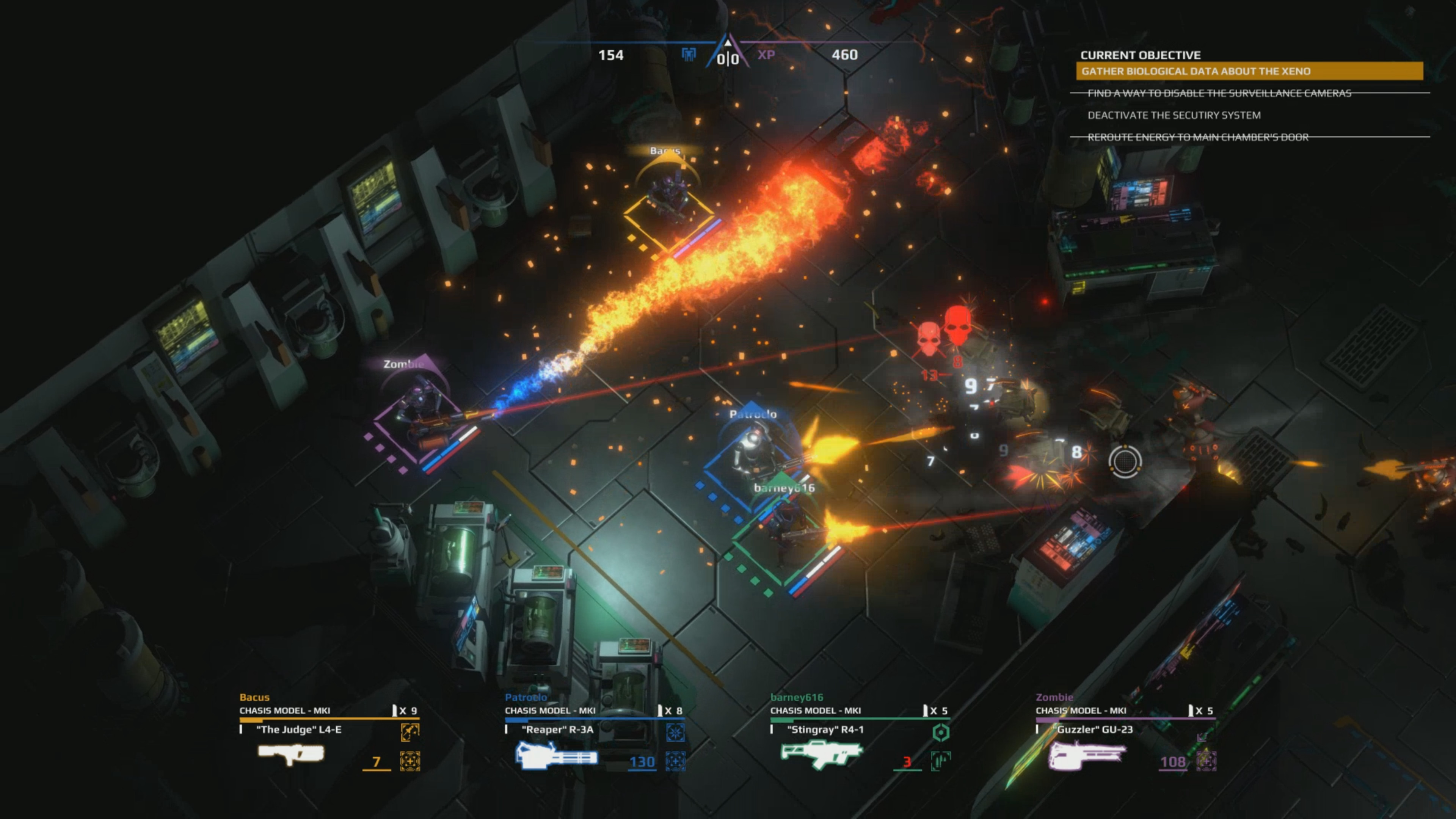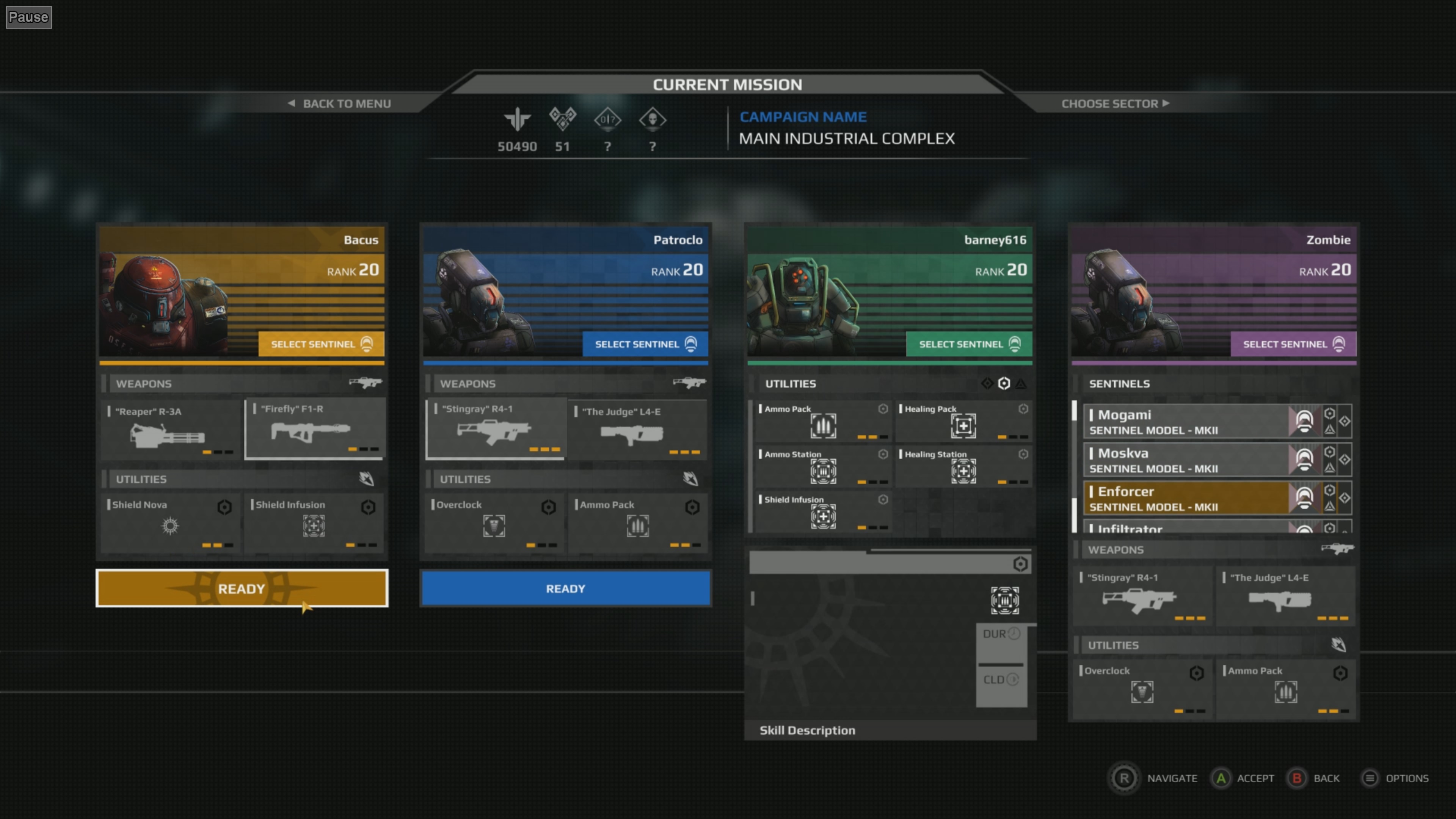Trident’s Wake is a spiritual successor to Helldivers that needs more interesting missions
The four player co-op hallway crawler has a fun foundation in Early Access, but no reason to keep playing.
I mentally organize my cooperative games by how much investment they require. Left 4 Dead can be played on autopilot, a casual hangout with friends through the apocalypse. Destiny raids, on the other hand, can require extreme coordination. I love both styles of co-op but I don't know quite what to do with Trident’s Wake, which feels stuck in a limbo between the two extremes. It occasionally shows you bits of depth and difficulty that go underused, at least so far in Early Access.
Developer Bacus Studios isn’t shy about Trident’s biggest inspiration: Helldivers. Both are twin stick shooters with a focus on four player co-op, procedural level generation, ammo scarcity, and alien murder. But whereas Helldivers’ battlefields are sprawling planet surfaces, Trident’s battles are fought in the dark, claustrophobic hallways of a desolate spaceship.
The simple mission design is too easily manipulated to force those moments of tension.
Trident’s Wake is light on story at the moment, but Bacus gave me the gist: After a cataclysmic event wipes out most life on Earth, the survivors retreat to the last human colony ship, the Trident, to survive. When they arrive, they find it overrun by hostile aliens. The humans deploy AI “sentinels” to take back the ship—aka me and you.
The current Early Access build has three zones: the industrial complex, tech labs, and crew quarters. The level select map shows room for at least six or seven additional areas. The areas look nice, but there’s a noticeable lack of variety in the industrial and lab zones. Besides some minor interior differences, they feel like the same interchangeable dark hallways with computer consoles and big machinery. The crew quarters’ colorful foliage and well-lit rooms are a welcome relief to the dreariness. Unfortunately, the level layouts don’t meaningfully change with a new zone. Every mission is a procedural smattering of square rooms connected by hallways with seemingly random enemy placement. It works, but it gets boring fast.
Mission variety is also an issue. As you’re loaded into a mission you’re automatically assigned four random tasks to complete before extraction. Even though the tasks range from shutting down a security system to downloading data from a terminal, they’re all mostly accomplished by approaching a terminal and pressing E. There’s no story, briefing, or explanation of any kind before loading into a mission. You’re just there, and you have to press E on stuff.
One bit of genuine suspense comes when you activate the elevator finale at the end of a mission and must survive a huge wave of baddies before the door opens. Trident’s Wake clearly wants every moment of a mission to crackle with that sense of danger and survival, but that just doesn't happen. The simple mission design is too easily manipulated to force those moments of tension—most tasks are completed as soon as you interact with the right console, so you can just sprint through the level avoiding enemies. Trident's Wake needs more involved objectives to give you a reason to stick around and fight.

Roll the dice
But when you're fighting, Trident's Wake is a fun time. Weapons cover a diverse range of loadouts. I spent most of my time with the trusty assault rifle and filled my secondary slot with something more situational like the beam rifle, minigun, or flamethrower for big crowds. The sentinels feel agile and control well with mouse and keyboard. Sprinting is a reliable way to crowd control a crammed arena of explosive enemies trying to rush you. The dash ability is handy for dodging incoming fire. Weapons generally feel punchy and balanced, but a few gun sounds are a bit generic and don't have the impact they feel like they should.
Keep up to date with the most important stories and the best deals, as picked by the PC Gamer team.
Trident’s Wake brings a fun twist to building a loadout thanks to its in-depth customization. Completing missions nets weapon parts and a resource called Metheria, which are used to upgrade or “recalibrate” weapons. Upgrading a weapon to a higher tier enormously improves its performance across the board, while recalibration is a much less expensive option that rerolls the weapon’s stats (damage, fire rate, clip size, etc) to hopefully create a better version. Upgrading a weapon’s tier requires rare weapons parts earned from completing missions. I never wanted to grind for them, since every mission feels more or less the same.
It’s kind of addicting to continuously reroll my assault rifle stats. It pings the same part of my monkey brain that gets a rush from opening loot boxes. There are no real money stakes to recalibration, thankfully, but a bad roll of stats and wasted currency faithfully emulates the empty feeling of pulling a slot machine lever and getting squat. One more try and I'll surely hit the jackpot.
Bacus hopes that recalibration will make every player’s weapon feel unique, but ultimately the differences here are minor. It’s hard to imagine a friend would ever notice that my flamethrower is doing slightly more damage while theirs has to reload slightly less often. It’s a cool concept, but the potential gains aren't worth it, from my experience. You’re better off banking currency until you can upgrade a weapon’s tier for a guaranteed improvement.

There is some strategy to deciding which sentinel to play as, but they again suffer from Trident’s problem of not going deep enough. Some sentinels have higher shields or can dash more between cooldowns, and each has a signature skill. The skills are mostly little backup attacks or buffs like Overclock, which increases the damage of your whole team for a time. The Shield Nova has the most interesting give/take of sacrificing the rest of your shield to unleash a burst of damage around you. The unlockable Tzar sentinel seems to have the objectively best ability at the moment, unleashing a rocket barrage for huge damage with a modest cooldown. It’d be nice to see more interactivity between the abilities so team composition feels like an important decision rather than a matter of preference.
Similar to Helldivers, Trident’s difficulty comes from a scarcity of health and ammo. Helldivers has a clever mechanic that forces players to take a moment of vulnerability to call in a resource airdrop, which actually forces you to punch in the correct command in the heat of the moment. In Trident, healing and stocking up are simplified so that all players have health or ammo pickups they can drop for the team at any time. This severely undercuts the reason for ammo scarcity in the first place. Having the ability to drop health kits on a short cooldown feels arbitrary and kills the tension of harder fights.
A lot of my complaints could be remedied in Early Access—Trident's Wake hasn't been out for long and is still missing many of its planned features. Health and ammo are the only secondary gear right now while ability upgrades and additional sentinels are listed as coming soon. Trident's Wake needs to give me more reasons to care about my loadout, and its missions need to give me a reason to fight, rather than just running past enemies for an easy, boring win. Bacus clearly has much larger aspirations for Trident’s Wake, but what’s there now is hard to recommend.

Morgan has been writing for PC Gamer since 2018, first as a freelancer and currently as a staff writer. He has also appeared on Polygon, Kotaku, Fanbyte, and PCGamesN. Before freelancing, he spent most of high school and all of college writing at small gaming sites that didn't pay him. He's very happy to have a real job now. Morgan is a beat writer following the latest and greatest shooters and the communities that play them. He also writes general news, reviews, features, the occasional guide, and bad jokes in Slack. Twist his arm, and he'll even write about a boring strategy game. Please don't, though.

